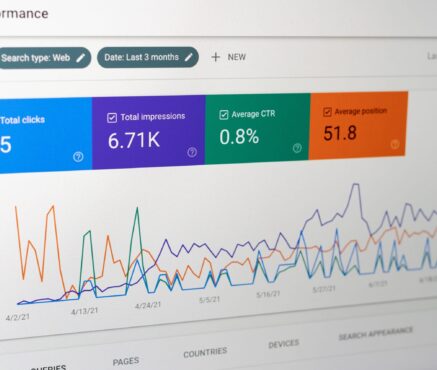Learn six simple strategies that will help measure your return on investment from SEO and link-building campaigns
So if you have recently started to utilize SEO to help your website's potential to rank on Google, you may be wondering how will you know if what you are doing is working? Will all the time and effort and money put into SEO and link-building be worth it? And most importantly, what is the return on your investment?
I had some of these questions myself at one point, and thought I'd ask others what is their number one method for measuring SEO ROI. I got some great feedback, and I have shared the best six methods with you below, along with my top picks for SEO tools and some link-building strategies.

Strategies to measure the ROI of your SEO:
Use Ahrefs
Ahrefs is "one-stop" when it comes to SEO. If you want to check the ROI of your SEO, use the Ahrefs rank tracker. You'll see at a glance if your keywords rank and if they go up or down Google's Search Engine Results Pages. If you want to measure the ROI of your link building campaigns, use Ahrefs Site Explorer. You'll see how many links you have, the types of links you have pointing at your site, and the effect of your link portfolio on your Domain Rating (DR). You can then take your DR and compare it against other websites in your niche. Ahrefs is easy to use for SEO, link building, and competitive analysis.
Janice Wald, Mostly Blogging
Track Ranking Changes of Performance-Driving Keywords
The impact of link-building campaigns is inherently hard to measure and simply looking at improvements in domain authority scores across Semrush, Ahrefs, or Moz may not be enough to quantify the impact. Ideally, most of these links would be built with keyword-rich anchor text that aligns with primary performance and conversion-driving keywords. While it's hard to know if all other ranking factors are being kept equal at the same time, if the keywords associated with the links have their ranking position start to improve while other site keywords remain flat, this could be an indication that the link-building campaign is working. Because these keywords drive conversions (which should have a value attached to them) the increase in traffic and conversions should be a way to tie increased revenue to the campaign.
Ryan Jacobsen, LaneTerralever
Focus on Conversions and Revenue
There are a number of factors to consider when measuring the ROI of your SEO and link-building campaigns. The most important factor is the revenue generated from organic search traffic. This can be measured by tracking the number of visitors to your website from organic search results, and calculating the conversion rate of those visitors. Other factors to consider include the cost of your SEO and link-building campaigns, the number of links built, and the quality of those links. By tracking all of these factors, you can get a clear picture of the ROI of your SEO and link-building campaigns.
Matt Davies, Slingshot Search
SEO ROI Statistics:
- SEO ROI can be as high as 12.2x marketing spend
- SEO can reduce the cost of customer acquisition by 87.41%
- Organic search drives 53.3% of all website traffic
- Organic traffic from SEO is more than 1,000% higher than organic traffic from social media.
Assign an Anticipated Value of Each Conversion Activity
One way to measure the ROI for SEO is to assign an anticipated value to each conversation activity. The value of your conversion action will be the actual revenue from the sale if your website accepts online payments. For example, you would assign a value to conversion actions such as the following for brands that produce leads rather than sales: form submissions, demo reservations, meeting contracts, free samples, newsletters, and email signups. After determining which ones they are, it would be best to give each action that makes the conversion funnel an appropriate economic value. A natural visitor who fills out a form indicates a possible client, but one who schedules a demo or appointment with your sales team is probably much further down the sales funnel. Therefore, a higher value should be given to the second action.
Brett Downes, Haro Helpers
Measure Your Click-Through Rate
Measuring the ROI of your SEO and link-building can be tricky, but the average click-through rate is often considered one of the most effective ways to do it. The click-through rate measures the number of people who click on a link divided by the number of people who see it. So, if you have a particularly high click-through rate, that means that people are more likely to click on your links than those of other sites. This, in turn, can lead to more traffic and conversions for your site. Of course, there are other factors to consider when measuring the ROI of your SEO and link-building campaigns, but the average click-through rate is a good place to start.
Divya Karthik, Plumbers Nearby
What are the best tools to use for SEO?
There's no doubt that SEO is one of the best strategies for business growth. But what tools are going to be the most beneficial to use for your business? Here are some of my favorites:
SEO Screaming Frog Spider
If you are looking for an advanced in-depth crawl tool that is efficient and effective, then you need SEO Screaming Frog Spider. This tool allows you to crawl up to 500 URL's for free, and an unlimited amount if you want to pay for the full version ($209 USD per year). There are so many features that make this tool a worthwhile investment, including the ability to find broken links, audit redirects, crawl Javascript sites, generate XML sitemaps, and also integrate with Google Analytics and Google Search Console. What isn't to love about that?
Ahrefs
As mentioned above in the article, ahrefs is one of the best tools because it has so many features that make implementing SEO a lot easier and accessible for those who aren't experts. It is a great all in one tool for SEO, and is used by thousands of people and businesses worldwide to help them optimize their website.
Google Search Console
Google Search Console is a must have tool for anyone that is doing SEO. It allows you to easily monitor and in some cases resolve server errors, site load issues, and security issues like hacking and malware. You can also use it to ensure any site maintenance or adjustments you make happen smoothly with respect to search performance.

Semrush
If you're looking for an SEO tool that can really help your business grow, then you should definitely consider using Semrush. This popular platform is incredibly versatile and can be used for so many different things including keyword research, backlink analysis and more.
References
Terakeet, 2022, 55 Compelling SEO Statistics and Facts, retrieved from
https://terakeet.com/blog/seo-statistics/. Accessed 30 August 2022.
You May Also Like...



